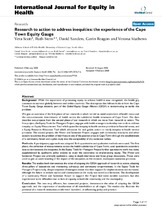| dc.contributor.author | Scott, Vera | |
| dc.contributor.author | Stern, Ruth | |
| dc.contributor.author | Sanders, David | |
| dc.contributor.author | Reagon, Gavin | |
| dc.contributor.author | Mathews, Verona | |
| dc.date.accessioned | 2010-11-24T11:58:40Z | |
| dc.date.available | 2010-11-24T11:58:40Z | |
| dc.date.issued | 2008-01-04 | |
| dc.identifier.citation | Scott V., Stern R., Sanders D., Reagon, G. & Mathews, V. (2008). Research to action to address inequities: The experience of the Cape Town Equity Gauge. International Journal for Equity in Health, 7:6. | en_US |
| dc.identifier.uri | http://hdl.handle.net/10566/171 | |
| dc.description.abstract | BACKGROUND: While the importance of promoting equity to achieve health is now recognised, the health gap
continues to increase globally between and within countries. The description that follows looks at how the Cape
Town Equity Gauge initiative, part of the Global Equity Gauge Alliance (GEGA) is endeavouring to tackle this
problem.
We give an overview of the first phase of our research in which we did an initial assessment of health status and
the socio-economic determinants of health across the subdistrict health structures of Cape Town. We then
describe two projects from the second phase of our research in which we move from research to action. The
first project, the Equity Tools for Managers Project, engages with health managers to develop two tools to address
inequity: an Equity Measurement Tool which quantifies inequity in health service provision in financial terms, and
a Equity Resource Allocation Tool which advocates for and guides action to rectify inequity in health service
provision. The second project, the Water and Sanitation Project, engages with community structures and other
sectors to address the problem of diarrhoea in one of the poorest areas in Cape Town through the establishment
of a community forum and a pilot study into the acceptability of dry sanitation toilets.
METHODS: A participatory approach was adopted. Both quantitative and qualitative methods were used. The first
phase, the collection of measurements across the health subdistricts of Cape Town, used quantitative secondary
data to demonstrate the inequities. In the Equity Tools for Managers Project further quantitative work was done,
supplemented by qualitative policy analysis to study the constraints to implementing equity. The Water and
Sanitation Project was primarily qualitative, using in-depth interviews and focus group discussions. These were
used to gain an understanding of the impact of the inequities, in this instance, inadequate sanitation provision.
RESULTS: The studies both demonstrate the value of adopting the GEGA approach of research to action, adopting
three pillars of assessment and monitoring; advocacy; and community empowerment. In the Equity Tools for
Managers Project study, the participation of managers meant that their support for implementation was increased,
although the failure to include nurses and communities in the study was noted as a limitation. The development
of a community Water and Sanitation Forum to support the Project had some notable successes, but also
experienced some difficulties due to lack of capacity in both the community and the municipality.
CONCLUSION: The two very different, but connected projects, demonstrate the value of adopting the GEGA
approach, and the importance of involvement of all stakeholders at all stages. The studies also illustrate the
potential of a research institution as informed 'outsiders', in influencing policy and practice. | en_US |
| dc.language.iso | en | en_US |
| dc.publisher | BioMed Central | en_US |
| dc.rights | © 2008 Scott et al; licensee BioMed Central Ltd. This is an Open Access article distributed under the terms of the Creative Commons Attribution License (http://creativecommons.org/licenses/by/2.0), which permits unrestricted use, distribution, and reproduction in any medium, provided the original work is properly cited. | |
| dc.source.uri | http://dx.doi.org/10.1186/1475-9276-7-6 | |
| dc.subject | Research to action | en_US |
| dc.subject | Health systems and policy research | en_US |
| dc.subject | Health equity | en_US |
| dc.subject | Cape Town | |
| dc.title | Research to action to address inequities: The experience of the Cape Town Equity Gauge | en_US |
| dc.type | Article | en_US |
| dc.privacy.showsubmitter | false | |
| dc.status.ispeerreviewed | true | |

